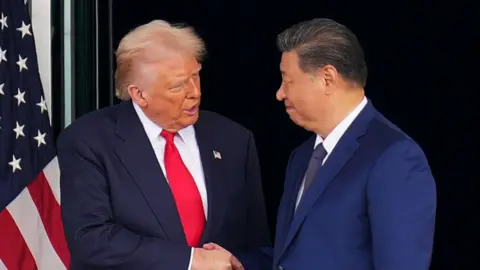US presidential trips abroad have traditionally been an opportunity to display the power of the American nation on the world stage. Donald Trump's five-day swing through eastern Asia, on the other hand, has been a display of the power of Trump - but also, at times, of that power's limitations.
Trump's stops in Malaysia, Japan and South Korea over the course of the first four days were an exercise in pleasing a sometimes mercurial American president. It was an acknowledgement that Trump, with the flick of a pen, could impose tariffs and other measures that have the potential to devastate the economies of export-dependent nations.
His sit-down with Chinese leader Xi Jinping on Thursday, however, was something entirely different.
It was a meeting of equals on the global stage, where the stakes for both nations – for their economies, for their international prestige, for the welfare of their people - were enormous.
With China, Trump may flick his pen, but such actions come with consequences. They come with a cost.
- Trump hails 'amazing' meeting with Xi but no trade deal agreed
- Xi and Trump find temporary truce as China plays longer game
For the first four days, Trump's most recent foray into global diplomacy was smooth sailing.
Each stop was punctuated by a blend of traditional trade negotiations – deals made under the shadow of Trump's reciprocal tariffs – and personal accommodations that at times bordered on the obsequious.
In Malaysia, Trump secured access to critical minerals and made progress toward finalising trade arrangements with south-east Asian nations. He also presided over a treaty that should ease border tensions between Thailand and Cambodia – the kind of peace deal the American president loves to tout.

In Japan, Trump's Marine One flew past a Tokyo Tower lit red, white and blue – with a top in Trumpian gold.
Newly elected Prime Minister Sanai Takaichi detailed $550bn in Japanese investments in the US and offered the American president a gift of 250 cherry trees for America's 250th birthday, and a golf club and bag that belonged to Shinzo Abe, the assassinated former prime minister who bonded with Trump in his first term.
She also became the latest foreign leader to nominate Trump for his much-desired Nobel Peace Prize.
Not to be outdone, South Korea welcomed Trump with artillery firing a 21-gun salute and a military band that played Hail to the Chief and YMCA – the Village People song that has become a Trump rally anthem.
Trump received a warm welcome - complete with gifts - from Japan's prime minister.
President Lee Jae Myung held an honour ceremony for Trump during which he gave the American leader his nation's highest medal and a replica of an ancient Korean dynastic crown.
In the US, Trump may be the subject of No Kings demonstrations by Americans who disapprove of his boundary-testing expansions of presidential power, but during his East Asia swing he was treated like royalty.
And like the kings of old, Trump arrived in Korea seeking tribute – in the form of $200bn in cash payments, $20bn a year, from South Korea to the US, to be invested at the direction of Trump's government. Agreement on the terms of those payments helped ensure that the tariff rate on South Korean exports to the US would drop from 25% to 15%.
The main event of Trump's Asia trip came in its final hours, however, as he met with Xi.
It was perhaps a reflection of the high stakes that when Trump shook hands with Xi in Busan, he appeared tense. It was a far cry from his relaxed attitude when he told me the day before that he was optimistic he would have a good meeting.
For months, Trump had been threatening higher tariffs on Chinese exports to the US – as a source of revenue for the American treasury as well as to pressure China to open its markets and control the export of chemicals used to make the drug fentanyl.
China, unlike many of America's other trading partners, responded with escalation, not concessions.
Trump's mood was upbeat after the meeting, which he described as amazing and graded a 12 on a scale of 1-10. However, it was a battle of wills that set the path for both nations to recognize that the tariff situation was unsustainable, leading to an acknowledgment to de-escalate tensions.
The international order that will take its place, however, is far from clear. As Xi acknowledged in his opening remarks at the bilateral meeting, China and the US do not always see eye to eye with each other.
Trump may be returning to America with everything he wanted from this trip. But, in a twist on the Rolling Stones song that he used to play at his political rallies, it's not yet clear that he got what America needs.




















